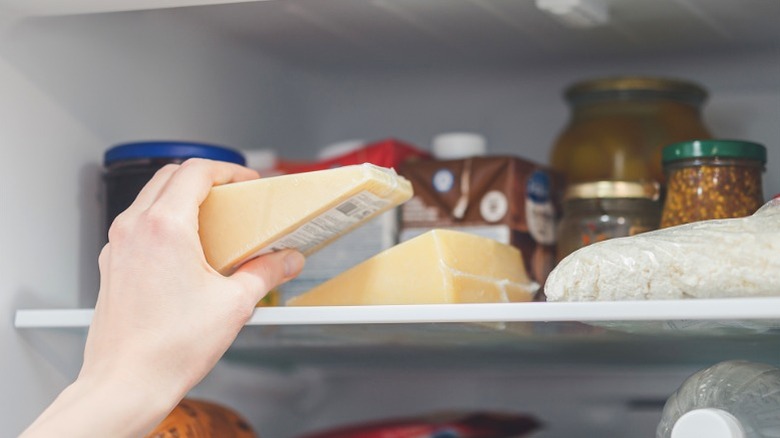How To Store Stinky Cheese To Keep It Fresh And Its Smell Contained
Cheese is a food people take quite seriously as there are so many kinds out there with unique culinary purposes. But to treat them all the same would be a mistake. There's a reason why grocery stores wrap cheese in plastic, but you can do better. Stinky cheeses need some extra care when it comes to storage, lest they offend your nose or tastebuds. Believe it or not, there's a Cheese State University for dedicated mongers, and Chowhound reached out to its Dean of Mongers, Molly Browne, for advice.
Browne is also the education director for the Dairy Farmers of Wisconsin, home of some of America's finest dairy products. Browne explains how she stores cheese in an isolated drawer in the refrigerator, and says the secret to keeping it fresh involves utilizing cheese paper. "Stinky cheeses have a living rind that makes all that funk, so your at-home storage techniques should make an effort to keep that rind alive. I prefer to use cheese paper which is lightly perforated, allowing cheese to 'breathe,'" she notes.
Browne's cheese paper of choice is Formaticum, which is available to purchase from the company's website or via Amazon. For anyone new to cheese paper — or looking for fresh parchment paper cooking hacks — she shares, "I recommend loosely wrapping the cheese in parchment or waxed paper and storing it in a resealable container."
Why cheese might be funking up your fridge
There's a scientific reason why Limburger and Camembert cheese might smell like a dirty sock to some folks. Cheese has a rind with microorganisms like yeast, bacteria, and mold. When microbes eat milk proteins, they release a gas that our noses can detect, and which many often dislike, according to the American Chemical Society. Suffocating cheese with improper storage kills the good microorganisms and traps the ammonia they produce.
Storing stinky cheese in cheese paper and keeping it in a cool place helps prevent it from spoiling sooner, and thus, stinking worse than it should. Keep the cheese drawer in your refrigerator clean and sanitized, and keep your cheese away from other foods. Make sure all foods are covered because harmful bacteria can form and transfer from one item to another even in the fridge, and you don't want to find out what happens if you accidentally ingest mold. Proper storage will keep your cheese tasty and safe to consume for all of your cooking endeavors.

